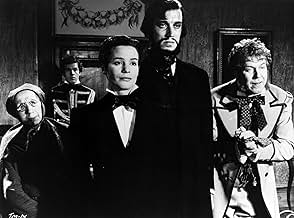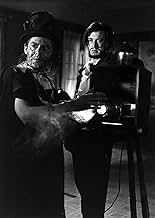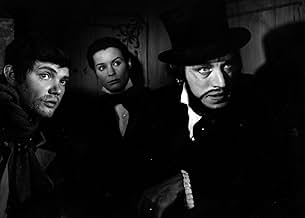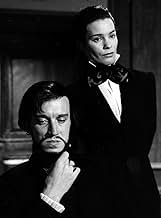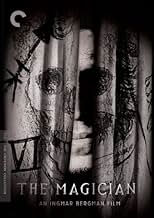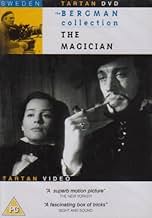ÉVALUATION IMDb
7,5/10
12 k
MA NOTE
Ajouter une intrigue dans votre langueA traveling magician and his assistants are persecuted by authorities in Sweden of the 19th century. Their capture, however, didn't bring victory to those in power.A traveling magician and his assistants are persecuted by authorities in Sweden of the 19th century. Their capture, however, didn't bring victory to those in power.A traveling magician and his assistants are persecuted by authorities in Sweden of the 19th century. Their capture, however, didn't bring victory to those in power.
- Nominé pour le prix 1 BAFTA Award
- 3 victoires et 2 nominations au total
Frithiof Bjärne
- Border Officer
- (uncredited)
Tor Borong
- Border Officer
- (uncredited)
Avis en vedette
I've seen a lot of Ingmar Bergman films and sometimes I don't want to see one of his films about death or mental illness. Well, starting in the 1960s to the 1980s, these were the main themes of his movies, but in some of his earlier films, these are not so pervasive--such as the movies The Devil's Eye (a comedy) and The Magician ("Ansiktet"). Because of this, they may be more approachable to the average viewer who would balk at the much more serious tone of such classics as Through a Glass Darkly (deep depression), Persona (mental illness), Autumn Sonata (repressed anger and abandonment), The Seventh Seal (death and the plague) or Fanny and Alexander (child abuse and emotional neglect).
The story is about a traveling group of hoaxters who put on a show combining magic and "animal magnetism" (i.e., an early name given to hypnosis). When they arrive at a Swedish town, they are forced to come to an audience with the local official and his cronies who want to prove that the act is a fraud. Bergman really doesn't try to resolve this issue, but instead shows how the town officials are really rather petty and mean people. How this traveling group deftly survives this encounter is the main focus of the movie. I especially liked the portion of the movie about the autopsy. It sounds gross, but I thought it was actually kind of funny. One of the officials is a cold and rather nasty doctor who longs for a chance to do an autopsy on the hypnotist. He gets far more than he bargains for--that's all I really want to say--otherwise it might ruin the suspense.
So, overall I liked the movie. It was not great but well acted and not the least bit depressing.
The story is about a traveling group of hoaxters who put on a show combining magic and "animal magnetism" (i.e., an early name given to hypnosis). When they arrive at a Swedish town, they are forced to come to an audience with the local official and his cronies who want to prove that the act is a fraud. Bergman really doesn't try to resolve this issue, but instead shows how the town officials are really rather petty and mean people. How this traveling group deftly survives this encounter is the main focus of the movie. I especially liked the portion of the movie about the autopsy. It sounds gross, but I thought it was actually kind of funny. One of the officials is a cold and rather nasty doctor who longs for a chance to do an autopsy on the hypnotist. He gets far more than he bargains for--that's all I really want to say--otherwise it might ruin the suspense.
So, overall I liked the movie. It was not great but well acted and not the least bit depressing.
8sol-
An appropriately mysterious Gothic tale with fascinating characters, who may or may not actually possess certain powers, the material is envisioned well by Ingmar Bergman, with careful attention to lighting design, and the acting is superb. Max Von Sydow is given the most intriguing part to play, and he pulls it off well, but Ingrid Thulin and Naima Wifstrand both deserve mentions for breathing life into their fey characters too. The film is about illusions ultimately, and those who are too critical to suspend their disbelief. It is a bit hard though interpreting exactly what Bergman intended by some of the oddities that he has placed in, such as dispersing poison to a young man. Are these attempts to add humour to the tale? Even with these odd inclusions and rushed ending that is a let down, it is quite a satisfying film overall. The music is great, the acting is excellent, and the interesting characters help make this film one of Bergman's most intriguing pieces.
I didn't expect to like this movie, given its period, headline subject matter etc. But don't let those factors put you off, there is real depth and some top notch scenes in this surprisingly superb movie.
Max von Sydow, Gunner Bjornstrand and Ingrid Thulin are three of Bergman's most consistent quality performers and all three have major roles in this film. There are a fair number of stereotypical character parts, mostly performed by ensemble quality character actors. Bibi Andersson is capable of far more than her giggly girl part enables her to show in this film. Indeed, there is some comedic material in this film reminiscent of Smiles of a Summer Night, but don't mistake this movie for one of Bergman's less masterful light pieces, this has real depth and substance.
There are some amazing bits of cinematography, especially the early scenes. The pacing of the movie is masterful, as is the clever use of parallels in the story - the failed actor "dying" and then reviving is a prelude to the pivotal incident around Vogler's "demise".
Top notch scenes include Mrs Egerman opening up to Vogler - she seems so lost - also both scenes in which Bjornstrand's character (Vergerus) insists that he was not taken in by the "magic".
This is now in my Bergman top 5, which makes it a "must see" in my book.
Max von Sydow, Gunner Bjornstrand and Ingrid Thulin are three of Bergman's most consistent quality performers and all three have major roles in this film. There are a fair number of stereotypical character parts, mostly performed by ensemble quality character actors. Bibi Andersson is capable of far more than her giggly girl part enables her to show in this film. Indeed, there is some comedic material in this film reminiscent of Smiles of a Summer Night, but don't mistake this movie for one of Bergman's less masterful light pieces, this has real depth and substance.
There are some amazing bits of cinematography, especially the early scenes. The pacing of the movie is masterful, as is the clever use of parallels in the story - the failed actor "dying" and then reviving is a prelude to the pivotal incident around Vogler's "demise".
Top notch scenes include Mrs Egerman opening up to Vogler - she seems so lost - also both scenes in which Bjornstrand's character (Vergerus) insists that he was not taken in by the "magic".
This is now in my Bergman top 5, which makes it a "must see" in my book.
Everybody wants to believe, born into a world that constantly deceives, that magic is real, as we make a deal, with an agent that death's door conceals - or at least that was the case in ages past when such beliefs were seared into you from birth.
Don't be fooled by what you see, the customs, costumes distract thee, a grand façade to suck you in, from birth, controlled, conditioning.
The illusions that confuse and abuse perfectly encapsulated in a magical and mesmerising piece of cinema that merits repeated reviewing, and why wouldn't you with several Bergman stalwarts performing to their absolute best, and some.
Don't be fooled by what you see, the customs, costumes distract thee, a grand façade to suck you in, from birth, controlled, conditioning.
The illusions that confuse and abuse perfectly encapsulated in a magical and mesmerising piece of cinema that merits repeated reviewing, and why wouldn't you with several Bergman stalwarts performing to their absolute best, and some.
Many people may have missed the satisfaction of reading the extra layer of meaning in this film: that the "magician" is the the filmmaker or visa versa, in this case Bergman himself. Without giving anything of the plot away, I can say that The Magician is a reflection on Bergamn's role as a creator of illusions. He uses the story of a roving theatrical troupe with an magician to illuminate the metaphor. The apparently abrupt turn of events at the end is Bergman's signal that he is the master of your perceptions in this medium, that he compares to the experience of dreaming.
It is interesting to compare this film with Fellini's 8 1/2, another filmmaker's reflection on the process and meaning of film-making. Two very different sensibilities are at work in these two films, but with surprisingly close parallels in their endings, and involuted plots.
I found this film highly satisfying on many levels, even taken at its apparent face value, as a romp. Seen a second time the illusionist begins to emerge more clearly, from the moment the film opens, with the lighting of the arc lamp of a film projector.
It is interesting to compare this film with Fellini's 8 1/2, another filmmaker's reflection on the process and meaning of film-making. Two very different sensibilities are at work in these two films, but with surprisingly close parallels in their endings, and involuted plots.
I found this film highly satisfying on many levels, even taken at its apparent face value, as a romp. Seen a second time the illusionist begins to emerge more clearly, from the moment the film opens, with the lighting of the arc lamp of a film projector.
Le saviez-vous
- AnecdotesThe character of Vogler was based on Bergman himself.
- Gaffes(at about 13 mins) When Tubal gets on in a carriage, a policeman hangs outside the carriage door but in the very next shot, the policeman is again seen to hang on the same door.
- Citations
Dr. Vergerus, Minister of Health: Either this is a dream or I'm losing my mind. Since It's inconceivable that I've lost all reason, I'll just wait till I wake up.
- ConnexionsFeatured in Premio Donostia a Max Von Sydow (2006)
Meilleurs choix
Connectez-vous pour évaluer et surveiller les recommandations personnalisées
- How long is The Magician?Propulsé par Alexa
Détails
- Durée1 heure 41 minutes
- Couleur
- Mixage
- Rapport de forme
- 1.33 : 1
Contribuer à cette page
Suggérer une modification ou ajouter du contenu manquant

